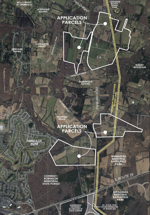-
- By Daniel Berti Times Staff Writer
- Updated

Will Pageland Lane in rural western Prince William become the county’s data center alley?
The Prince William Board of County Supervisors took the first step Wednesday morning toward studying 800 acres of agricultural land on Pageland Lane near the Manassas National Battlefield Park – as well as the entire, surrounding 4.5-mile Pageland Lane corridor – for potential new data center development.
The board voted 5-3 along party lines to initiate the study of a comprehensive plan amendment for a proposed “PWC Digital Gateway,” an application submitted by 12 Pageland Lane landowners.
If the CPA is ultimately approved by the county board, it would pave the way for up to 21 million square feet of data centers to be built across three non-contiguous sites in the area. All of the properties are in the county’s designated rural area, often called the “rural crescent.”

The board’s five Democratic members voted in favor of initiating the plan, while the board’s three Republicans voted against it.
After an evaluation by county staff, the CPA will be reviewed by the planning commission before heading to the board of county supervisors for final approval. Before data centers are actually built on the properties, landowners or developers will have to receive approvals for rezonings and possibly special use permits, both of which would also be reviewed by both boards.
Parag Agrawal, the county’s planning director, said the board’s action on Wednesday is “a basic first step” in the planning process that will include several more public hearings and plenty of public input.
Dozens of landowners who live along Pageland Lane, including the applicants, urged the board to move the project forward Tuesday, July 20. Many residents said encroaching development and traffic has changed the area’s once-rural character.
“The reason why we’ve been here for generations is [because of] what Prince William used to be. It’s no longer that way. Yes, we’re cashing in. But we’re also giving back to the county … By approving the digital gateway, the county will receive millions in revenue for years to come,” said John Brower, whose family owns some of the land being considered for data centers.
Others said the land is suitable for data centers because of a Dominion Energy transmission line built in 2008 that traverses many of the Pageland Lane properties, and a 3 million square foot data center campus called Gainesville Crossing that was approved along Pageland Lane in 2019, directly across the street from Manassas National Battlefield Park.
“This is a part of the rural area that has been consumed by growth by the surrounding counties of Loudoun and Fairfax. Pageland Lane corridor has been rendered a dead zone due to the expanding truck and commuter traffic congestion and the high-tension power lines through our properties,” said Tom Ackerly, a Pageland Lane resident.
Last month, a dozen western Prince William landowners asked the county to re-plan 792 acres …
Additionally, a dozen other Pageland Lane residents who live in the Dominique Estates subdivision are asking the county to allow data center uses on their properties as part of the county’s comprehensive plan update. It is not yet clear whether other landowners in the area may also be considering similar changes.
Local and regional conservation groups have raised concerns about any plans for more data centers next to the battlefield. A coalition of six conservation groups, including the National Parks Conservation Association, Prince William Conservation Alliance and Piedmont Environmental Council, held a press conference ahead of the board meeting in opposition to the data center proposal.

The rural crescent is a land-use designation created by the board of supervisors in 1998 aimed at slowing suburban sprawl. The rural crescent includes about one-third of all developable land in the county. Current zoning rules allow for the construction of only one home per 10 acres and mostly prohibit connections to the public sewer line.
“There is no need to build data centers here, in Prince William County’s protected rural crescent, a bastion of green land in a rapidly urbanizing area. There is plenty of land already available in Prince William for data centers, so why bulldoze green space, disrupt local wildlife, and threaten national parks to build them?” the groups’ statement reads. “… Once this type of damage is done, this landscape will never be the same.”
More than 30 people spoke in opposition to the plan during the board meeting.
Brandon Bies, superintendent of Manassas National Battlefield Park, has also raised concerns about the impact of data centers near the park. One of the parcels planned for data centers directly borders the park, and 107 acres of the 800-acre proposal is within the park’s designated “core area” where combat occurred during the Battle of Manassas.
“My concern is a significant change in the land use, whether it’s data centers or something else, has the potential to impact our views that are enjoyed by our visitors,” Bies said.
Motion to defer fails
Supervisor Pete Candland, R-Gainesville, who lives on the Pageland Lane corridor less than a mile from the proposed data center development, is opposed to the plan.
Candland made a motion to defer the study of the comprehensive plan amendment until the county completes a study of the county’s “Data Center Opportunity Overlay District” for potential expansion, which was initiated earlier this year. The board voted down the deferral on a party-line, 3-5 vote.
“I feel this slipping away as far as being able to protect this area from development. I think that’s sad. I think we have a very unique area here that is right at the feet of the Manassas battlefield, our most visited tourist attraction in Prince William County. This is a special place,” Candland said.
Supervisor Jeanine Lawson, R-Brentsville, is also opposed to allowing data center development in the rural area. Lawson said she is concerned the huge data centers will someday outlive their use, resulting in blighted buildings throughout the county.
“Why we are going to open this door to such an absurd development idea is beyond my understanding,” Lawson said.
Some Democratic supervisors said the plan for data center development in the area could be a major source of local tax revenue. The county has long struggled to increase its commercial tax base and relies largely on residential real estate taxes to fund its annual budget.
Data centers have become an increasingly large share of the county’s commercial tax base as new facilities have come online over the last decade. Data centers generated $64 million in local tax revenues in 2020, according to county documents.
Supervisor Victor Angry, D-Neabsco, said the data center proposal on Pageland Lane “an economic opportunity” that could help pay for new initiatives, such as a new library and senior center in Woodbridge, which were also discussed and approved during the meeting, as well as lowering the residential property tax rate.
“If we want to get away from this residential tax — everyone screams about that — then we have to have a real conversation about where this funding is coming from,” Angry said.

